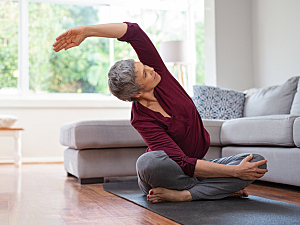Frailty is a significant geriatric concern, estimated to affect up to half of individuals over 80 years old. Treatment and prevention are difficult as many factors can contribute to frailty, including difficulty walking and maintaining balance, cognitive impairment, and certain chronic conditions.
Yoga, a mind-body practice involving breathing, meditation, and physical poses, has been shown to improve balance, mobility, and mental well-being in older adults.
For the first time, Brigham and Women’s Hospital researchers sought to understand if yoga could also improve frailty. Julia Loewenthal, MD, a geriatrician in the Division of Aging, Ariela R. Orkaby, MD, MPH, a geriatrician–epidemiologist in the Division, and colleagues reviewed 33 randomized controlled trials that reported how yoga affected individual metrics of frailty. In Annals of Internal Medicine and a recent Brigham press release, they report that yoga improved known predictors of longevity and frailty, such as walking speed and leg strength.
About the Study
The researchers utilized three databases to identify randomized controlled trials that evaluated the effect of yoga-based interventions, specifically individual frailty metrics. These include gait or walking speed, balance, handgrip strength, lower extremity strength and endurance, and other multi-component physical performance measures. The mean participant age was 72 years.
Of the 33 identified trials, improved walking speed had the strongest association with a yoga intervention, compared to controls who were inactive or received educational interventions. The researchers also report yoga may improve leg strength, which benefits daily activities like rising from a chair and getting out of bed.
Clinical Implications
Improved walking speed being strongly associated with yoga has significant clinical implications, as slower walking speeds are associated with higher death risk in older adults.
Although the researchers acknowledge several limitations of the study, including small sample sizes and inconsistencies in the types of yoga practice evaluated, their findings suggest that movement-based mind-body practices may be effective for frailty prevention. Future studies may include using validated definitions of frailty, such as the Fried physical phenotype or Rockwood cumulative deficit test, to assess the effect of yoga on frailty in older adults, as well as determining whether yoga is more effective as an early intervention for frailty at younger ages.
